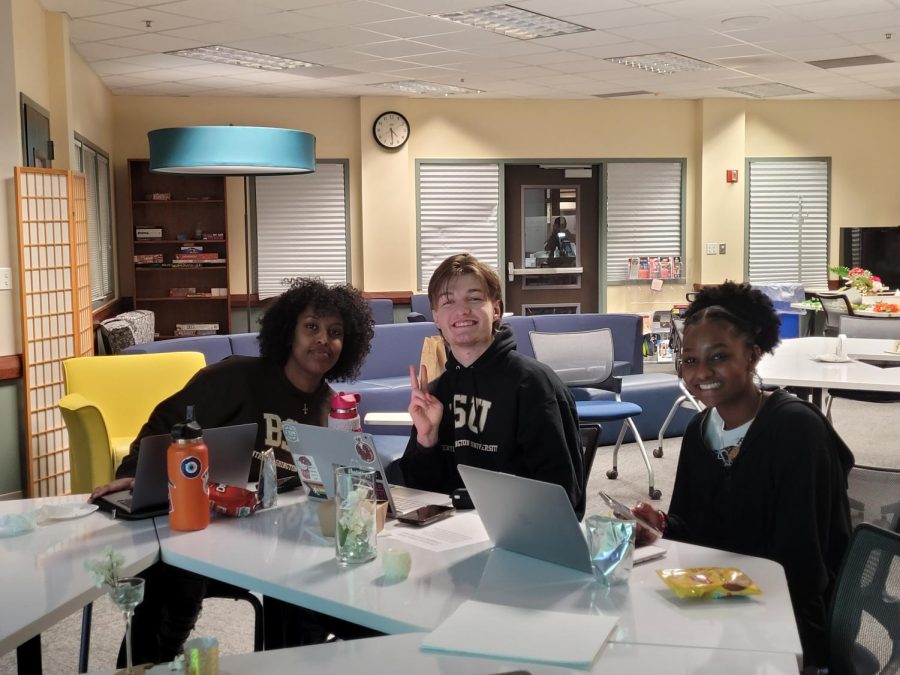Women’s Herstory Month: vision boards set the tone for women’s futures
Students gather for the Women’s Herstory Month kick-off in the DEC.
March 8, 2023
The soundtrack from “Bridgerton” softly played in the background of the Diversity and Equity Center (DEC) as feminine-identifying folk snacked on cupcakes and chatted amongst themselves.
The “Envisioning the Future” event took place on March 2 as a continuation of Women’s Herstory Month hosted by the DEC.
Victoria Linder, the organizer of “Envisioning the Future,” along with Women in STEM club officer and Equity and Services Council Representative for the Black Student Union Genet Wubbie offered a short presentation and discussion on the empowerment of women and the importance of gratitude.
During the presentation, the speakers talked about how important it is for women to recognize their achievements. They explained how writing letters and creating vision boards can help women do just that.
“I think that modern-day women/fems need to slow down and give themselves grace and reflect about all of the powerful things they do,” Linder said.
After the discussion, the DEC provided attendees with materials to either write a letter to an inspiring woman or create a vision board, which they would then print and display for Women’s Herstory Month.
THRIVE, an empowerment program which supports and provides validating spaces for women of color, is the inspiration for the vision boards, according to Linder. THRIVE created vision boards for the Women’s Herstory event last year.
“I remember thinking that I could feel the power from the vision boards created by those women,” Linder said. “I knew that I wanted this to help us look inward and feel our power and inspiration, and help us empower other women. I also wanted to give people the option to write letters of appreciation for those women who inspire us, or even take the time to write letters to our future selves.”
According to Wubbie, she is grateful for the opportunity to collaborate with Victoria and the DEC, and hopes to spread awareness of the Women in STEM club.
“It’s always nice to be a part of these spaces, especially for women of color because a lot of the classes, majors and jobs we’re in do not reflect what diversity should look like,” Wubbie said. “These types of events have encouraged me to keep the energy and the conversations I had at this Women’s History Month event outside of this event as well.”
Janiyah McNair, a junior studying sociology, said the event was much needed on campus and that she is glad it happened.
“The emphasis on gratitude is important for women in STEM … since STEM is male-dominated, being grateful for where you are at and remembering where you are at and how hard it’s been for you to get [to] that point … is good for women,” McNair said.
As Women’s Herstory Month continues, Wubbie reminded students to be grateful for the women in their lives and to remember the women who came before them.
“There are many women in history who go unnoticed and are forgotten in the history books,” Wubbie said. “Women like Coretta Scott King, who helped to lead the Civil Rights Movement. Women like Alicia Garza, one of the founders of the Black Lives Matter movement, are actively fighting to be seen and heard in a predominantly male community.”
According to Wubbie, women of the present deserve recognition too.
“Then there are the young women activists like Quinta Brunson, Yara S. Shahidi and Leticia Wright who are bringing us into the future of black women,” Wubbie said. “We do not only honor the women of the past, but the influential women of today, and the future women who are leading us into tomorrow.”
While the first week of Women’s Herstory Month has come to an end, according to Linder, people should keep their eyes open for events celebrating women throughout the month.
“I hope that people know that there are events going on all over to celebrate Women’s Herstory Month, and that they can find other powerful women to celebrate all of their accomplishments,” Linder said. “It can be a really powerful feeling, and I hope that people know that someone is always cheering for them.”


